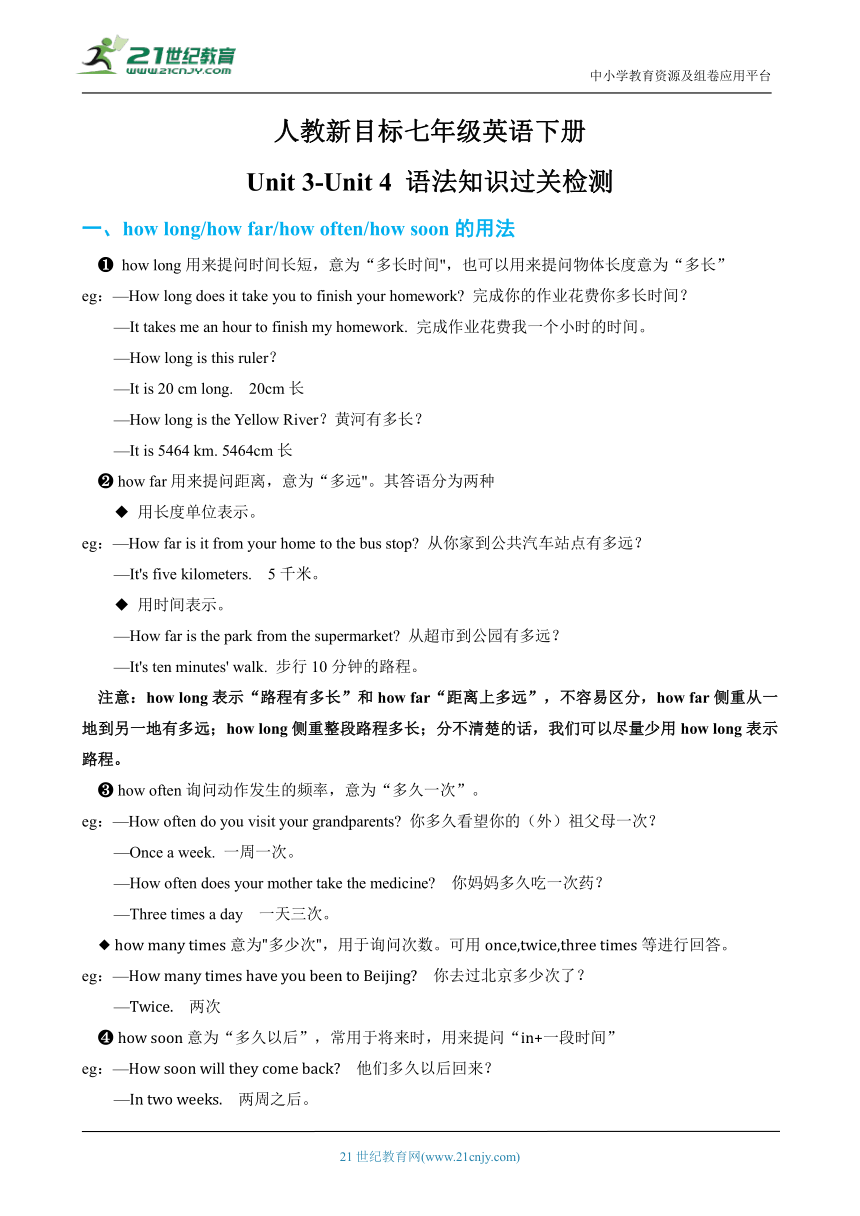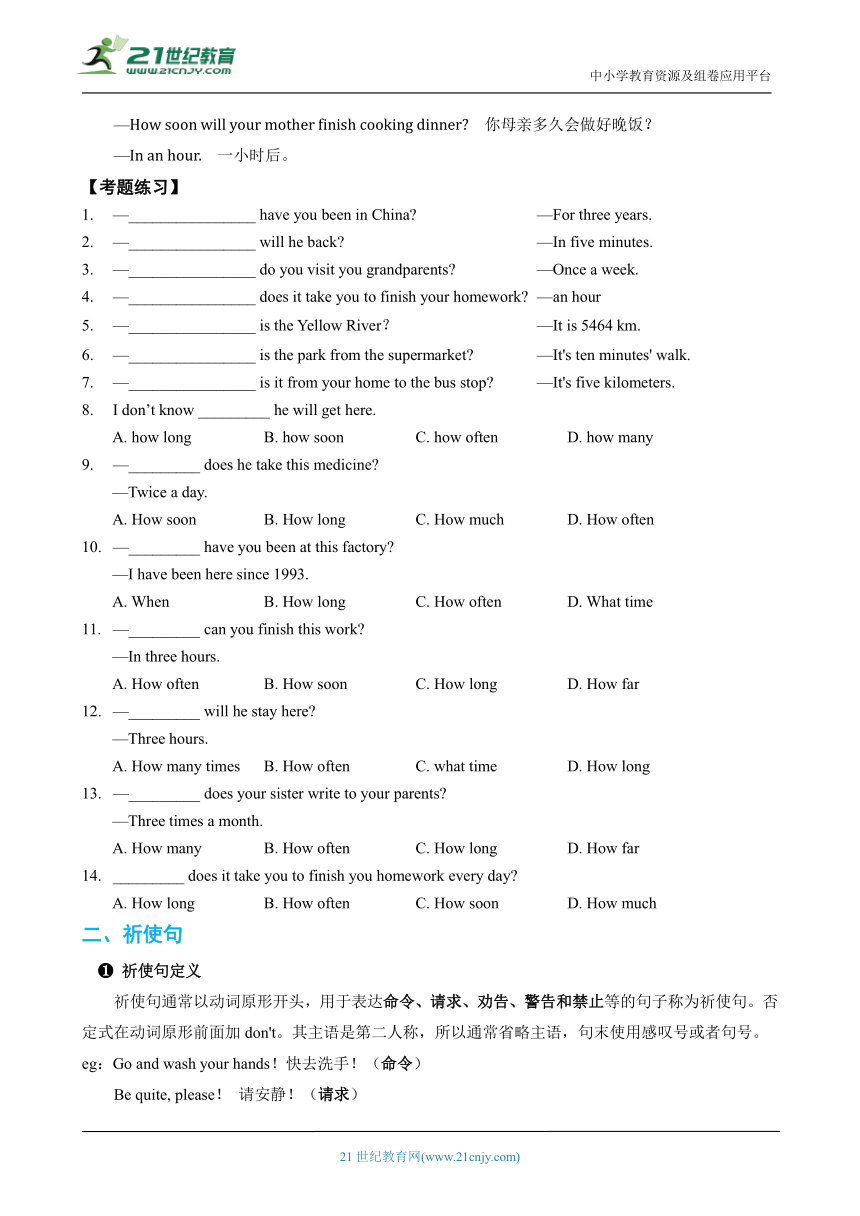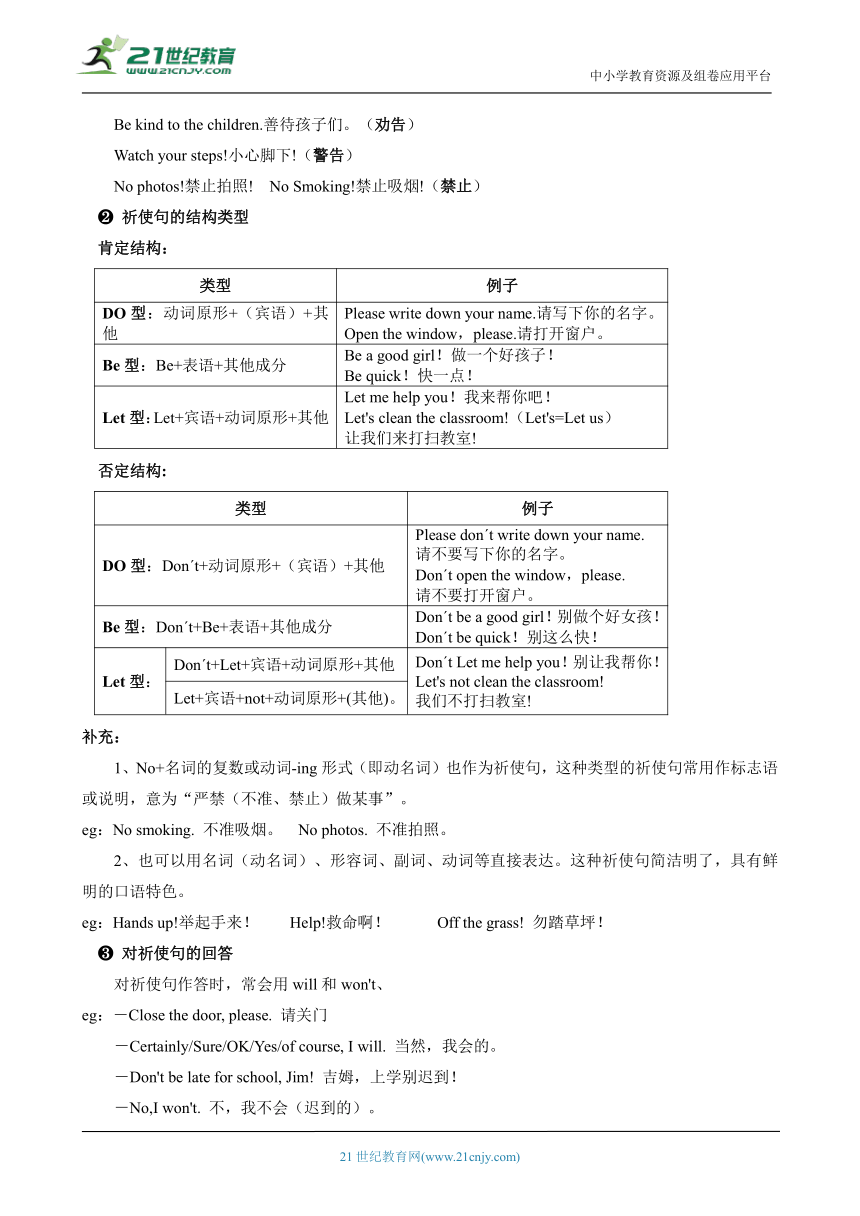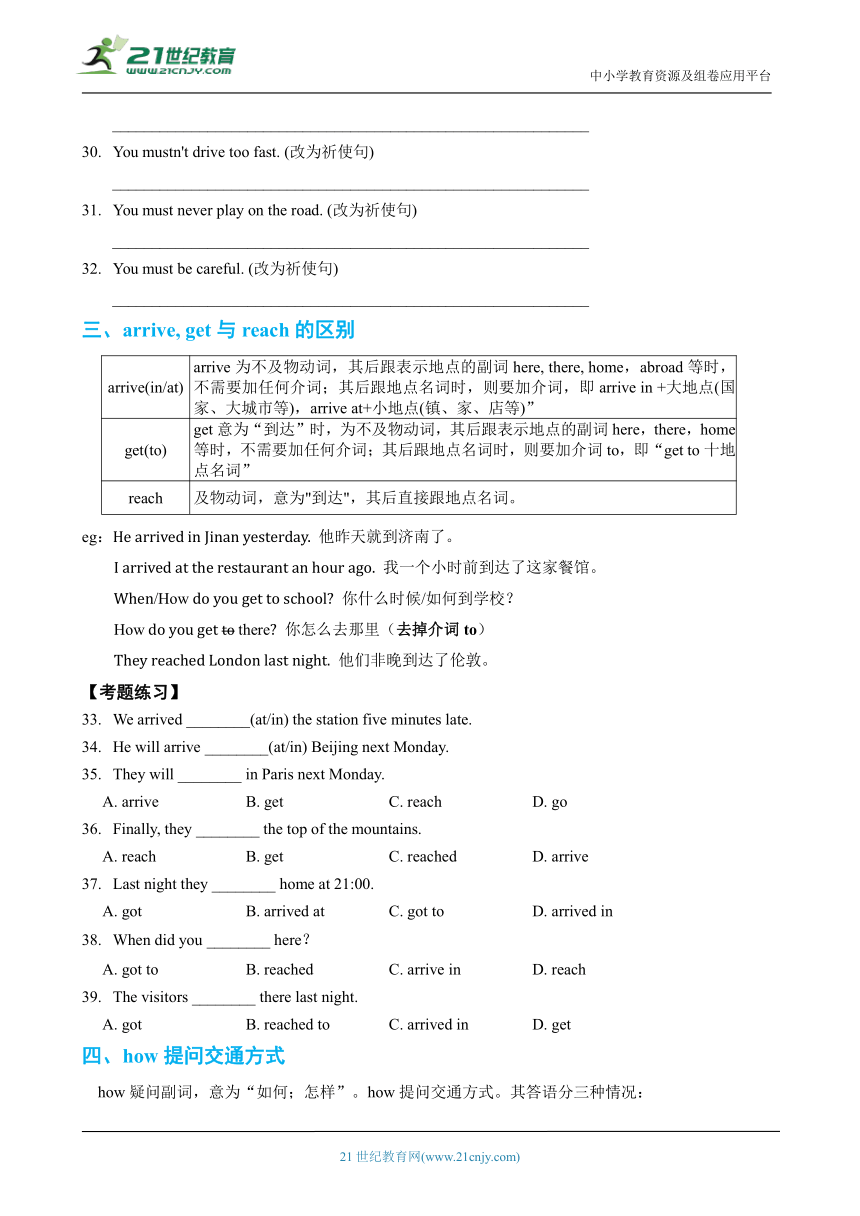【暑假作业】人教新目标七年级英语下册 Unit 3-Unit 4 语法知识过关检测(含答案)
文档属性
| 名称 | 【暑假作业】人教新目标七年级英语下册 Unit 3-Unit 4 语法知识过关检测(含答案) |  | |
| 格式 | docx | ||
| 文件大小 | 888.9KB | ||
| 资源类型 | 试卷 | ||
| 版本资源 | 人教新目标(Go for it)版 | ||
| 科目 | 英语 | ||
| 更新时间 | 2022-06-30 15:44:00 | ||
图片预览





文档简介
中小学教育资源及组卷应用平台
人教新目标七年级英语下册
Unit 3-Unit 4 语法知识过关检测
一、how long/how far/how often/how soon的用法
how long用来提问时间长短,意为“多长时间",也可以用来提问物体长度意为“多长”
eg:—How long does it take you to finish your homework 完成你的作业花费你多长时间?
—It takes me an hour to finish my homework. 完成作业花费我一个小时的时间。
—How long is this ruler?
—It is 20 cm long. 20cm长
—How long is the Yellow River?黄河有多长?
—It is 5464 km. 5464cm长
how far用来提问距离,意为“多远"。其答语分为两种
◆ 用长度单位表示。
eg:—How far is it from your home to the bus stop 从你家到公共汽车站点有多远?
—It's five kilometers. 5千米。
◆ 用时间表示。
—How far is the park from the supermarket 从超市到公园有多远?
—It's ten minutes' walk. 步行10分钟的路程。
注意:how long表示“路程有多长”和how far“距离上多远”,不容易区分,how far侧重从一地到另一地有多远;how long侧重整段路程多长;分不清楚的话,我们可以尽量少用how long表示路程。
how often询问动作发生的频率,意为“多久一次”。
eg:—How often do you visit your grandparents 你多久看望你的(外)祖父母一次?
—Once a week. 一周一次。
—How often does your mother take the medicine 你妈妈多久吃一次药?
—Three times a day 一天三次。
◆ how many times意为"多少次",用于询问次数。可用once,twice,three times等进行回答。
eg:—How many times have you been to Beijing 你去过北京多少次了?
—Twice. 两次
how soon意为“多久以后”,常用于将来时,用来提问“in+一段时间”
eg:—How soon will they come back 他们多久以后回来?
—In two weeks. 两周之后。
—How soon will your mother finish cooking dinner 你母亲多久会做好晚饭?
—In an hour. 一小时后。
【考题练习】
—________________ have you been in China —For three years.
—________________ will he back —In five minutes.
—________________ do you visit you grandparents —Once a week.
—________________ does it take you to finish your homework —an hour
—________________ is the Yellow River? —It is 5464 km.
—________________ is the park from the supermarket —It's ten minutes' walk.
—________________ is it from your home to the bus stop —It's five kilometers.
I don’t know _________ he will get here.
A. how long B. how soon C. how often D. how many
—_________ does he take this medicine
—Twice a day.
A. How soon B. How long C. How much D. How often
—_________ have you been at this factory
—I have been here since 1993.
A. When B. How long C. How often D. What time
—_________ can you finish this work
—In three hours.
A. How often B. How soon C. How long D. How far
—_________ will he stay here
—Three hours.
A. How many times B. How often C. what time D. How long
—_________ does your sister write to your parents
—Three times a month.
A. How many B. How often C. How long D. How far
_________ does it take you to finish you homework every day
A. How long B. How often C. How soon D. How much
二、祈使句
祈使句定义
祈使句通常以动词原形开头,用于表达命令、请求、劝告、警告和禁止等的句子称为祈使句。否定式在动词原形前面加don't。其主语是第二人称,所以通常省略主语,句末使用感叹号或者句号。
eg:Go and wash your hands!快去洗手!(命令)
Be quite, please! 请安静!(请求)
Be kind to the children.善待孩子们。(劝告)
Watch your steps!小心脚下!(警告)
No photos!禁止拍照! No Smoking!禁止吸烟!(禁止)
祈使句的结构类型
肯定结构:
类型 例子
DO型:动词原形+(宾语)+其他 Please write down your name.请写下你的名字。 Open the window,please.请打开窗户。
Be型:Be+表语+其他成分 Be a good girl!做一个好孩子! Be quick!快一点!
Let型:Let+宾语+动词原形+其他 Let me help you!我来帮你吧! Let's clean the classroom!(Let's=Let us) 让我们来打扫教室!
否定结构:
类型 例子
DO型:Don t+动词原形+(宾语)+其他 Please don t write down your name. 请不要写下你的名字。 Don t open the window,please. 请不要打开窗户。
Be型:Don t+Be+表语+其他成分 Don t be a good girl!别做个好女孩! Don t be quick!别这么快!
Let型: Don t+Let+宾语+动词原形+其他 Don t Let me help you!别让我帮你! Let's not clean the classroom! 我们不打扫教室!
Let+宾语+not+动词原形+(其他)。
补充:
1、No+名词的复数或动词-ing形式(即动名词)也作为祈使句,这种类型的祈使句常用作标志语或说明,意为“严禁(不准、禁止)做某事”。
eg:No smoking. 不准吸烟。 No photos. 不准拍照。
2、也可以用名词(动名词)、形容词、副词、动词等直接表达。这种祈使句简洁明了,具有鲜明的口语特色。
eg:Hands up!举起手来! Help!救命啊! Off the grass! 勿踏草坪!
对祈使句的回答
对祈使句作答时,常会用will和won't、
eg:-Close the door, please. 请关门
-Certainly/Sure/OK/Yes/of course, I will. 当然,我会的。
-Don't be late for school, Jim! 吉姆,上学别迟到!
-No,I won't. 不,我不会(迟到的)。
祈使句的反意疑问句
祈使句的反意疑问句,后面一般用will you或won't you。
以let me和let us开头的祈使句变为反意疑问句时,后面用will you;以let's开头的祈使句变反意疑问句时,后面用shall we。
eg:Open the door, will you 打开门,好務 .
Let us have a break, will you 让我们休息一下,好吗?
Let's go to school, shall we 咱们去上学,好吗?
陈述句变祈使句
eg:You can sit here. 你可以坐在这里。 (变祈使句)
Sit here, please! 请坐这儿
You can open the door. 你可以开门。(变祈使句)
Please open the door! 请开门!
You can’t put the book here. 你不能把书放在这里。 (变祈使句)
Don’t put the book here! 别把书放在这儿!
You mustn’t smoke. s你不能抽烟。 (变祈使句)
No smoking! 禁止抽烟
【考题练习】
Don't _______________ (arrive) late for Lucy's birthday party.
Please _______________ (listen) carefully to what the teacher says.
Don't _______________ (swim) in the river. It's too dangerous.
You must _______________ (make) the bed after you get up.
She has to _______________ (be) quiet in the library.
Let's _______________(follow) our family rules.
Kitty, _______________ (not, be) late for school again.
_______________ (not,make) any noise! The baby is sleeping.
No _______________ (smoke) here!
_______________ (not, let) the baby cry.
Let me try again, _________ _________ (反意疑问句)
Let’s say it together., _________ _________ (反意疑问句)
You mustn't smoke here. (改为祈使句)
____________________________________________________________
You can't climb the tree. (改为祈使句)
____________________________________________________________
You mustn't swim here. (改为祈使句)
____________________________________________________________
You mustn't drive too fast. (改为祈使句)
____________________________________________________________
You must never play on the road. (改为祈使句)
____________________________________________________________
You must be careful. (改为祈使句)
____________________________________________________________
三、arrive, get与reach的区别
arrive(in/at) arrive为不及物动词,其后跟表示地点的副词here, there, home,abroad等时,不需要加任何介词;其后跟地点名词时,则要加介词,即arrive in +大地点(国家、大城市等),arrive at+小地点(镇、家、店等)”
get(to) get意为“到达”时,为不及物动词,其后跟表示地点的副词here,there,home等时,不需要加任何介词;其后跟地点名词时,则要加介词to,即“get to十地点名词”
reach 及物动词,意为"到达",其后直接跟地点名词。
eg:He arrived in Jinan yesterday. 他昨天就到济南了。
I arrived at the restaurant an hour ago. 我一个小时前到达了这家餐馆。
When/How do you get to school 你什么时候/如何到学校?
How do you get to there 你怎么去那里(去掉介词to)
They reached London last night. 他们非晚到达了伦敦。
【考题练习】
We arrived ________(at/in) the station five minutes late.
He will arrive ________(at/in) Beijing next Monday.
They will ________ in Paris next Monday.
A. arrive B. get C. reach D. go
Finally, they ________ the top of the mountains.
A. reach B. get C. reached D. arrive
Last night they ________ home at 21:00.
A. got B. arrived at C. got to D. arrived in
When did you ________ here?
A. got to B. reached C. arrive in D. reach
The visitors ________ there last night.
A. got B. reached to C. arrived in D. get
四、how提问交通方式
how疑问副词,意为“如何;怎样”。how提问交通方式。其答语分三种情况:
◆ take a/the+表示交通工具的名词
◆ by +表示交通工具的单数名词
◆ on/in+限定词+表示交通工具的名词
eg:How do you go to work every day 你每天怎样去上班?
I take the subway to work. 我乘地铁去上班。
=I go to work by subway.
=I go to work in the subway.
【考题练习】
In Japan, many students go to school ________.
A. take a subway B. by subway C.by the subway D. by subways
My sister ________ the bus to school.
A. takes B.by C.in D. on
I usually go to school ________ train.
A. by B. in C. take D. on
Lily always goes to work ________ her car.
A. in B.by C. take D.with
Tom sometimes ________ a bike to library.
A. rides B. in C. by D. takes
My father never ________ my bike.
A. in B. take C. on D. by
五、hundred与hundreds of
hundred(百),thousand(千),million(百万),billion(十亿)等数词,当前面有具体数字时,表示确切数目,其后不加-s,且不和of连用。
eg:three hundred 三百 five thousand 五千 two million 二百万
若表示一个不确定的数目,前面没有具体数字,其后要加-s,且与of连用。
hundreds of …… 成百上千 millions of …… 数百万
thousands of …… 成千上万 billions of …… 数十亿
eg:millions of students 数百万学生 hundreds of cars 几百辆车
billions of people 数十亿人 thousands of bees 成千上万的蜜蜂
口诀:模糊数字两有(有s有of);具体数字两无(无s无of)
【考题练习】
Two ________ teachers and ________ children visit the museum on Children's Day.
A. hundreds of; hundred B. hundreds; hundreds of
C. hundred; hundred of D. hundred; hundreds of
The food in that supermarket is on sale, so more than ________ go shopping there.
A. 3 hundreds people B. 3 hundreds peoples
C. 3 hundred people D. 3 hundred peoples
Two________ children plant________ trees along the road.
A. hundreds; hundreds of B. hundreds; hundred of
C. hundred; hundreds of D. hundred; hundred of
六、spend,pay,cost与take
spend spend (spent, spent)作及物动词,意为“花费(时间、金钱)”。指花费时间、金钱;主语为人。 常用结构:sb. spend(s) time/money on sth.(或doing sth.)
take take其过去式是took,过去分词是taken,指花费时间。 常用结构:It takes sb. time to do sth.,it为形式主语。
pay 指支付、花费金钱;主语为人。 常用结构:sb. pay(s) (sb.) money (for sth.)
cost 指花费金钱;主语为物。 常用结构:sth cost(s) (sb. ) money
eg:How long does it take you to get to school 你到学校花费多长时间?
We spends a lot of time (in) reading books. 我们花很多时间读书。
It took the workers only 10 days to build the Huoshenshan hospital.
建造火神山医院只花了工人们10天时间。
Cleaning the garden took me half a day. 收拾花园花了我半天的时间。
I paid him 20 dollars for the book. 我付给他20美元买这本书。
I paid 30 yuan for the toy. 我支付了30元买这个玩具。
Wang Li paid 500 yuan for the bike. 王丽花500元买了这辆自行车。
The coat cost him 25 dollars. 这件外套花了他25美元。
Remembering these new words cost him a lot of time.
他花了大量时间才记住了这些单词。
【考题练习】
I spent twenty yuan on the dictionary.
=I ___________ twenty yuan ___________ the dictionary.
=The dictionary _____________________ twenty yuan.
我通常步行上学需要半个小时。
It usually __________ me half an hour __________ to school on foot.
It takes us half an hour _____________(clean) our classroom every day.
It takes ____________(our) eighty-four minutes ____________(walk) to school.
Roy works in London. It________ him about half an hour to get to work by bus every day.
A. costs B. spends C. takes D. pays
It takes ________ forty minutes ________ there by bus.
A. his; get B. him; gets
C. his; getting D. him; to get
七、watch, see, read与look的区别
watch “观看;注视”,常用于看电视、看戏、看比赛及各种表演等
see “看见;看到”,强调“看”的结果,为及物动词,后跟名词或代词作宾语
read “阅读;读”,常用于读书、看报、看杂志等
look “看;瞧”,强调“看”的动作,为不及物动词,后接宾语必须与介词at连用
eg:Look! The boy is watching the football game. His father is seeing a film and his mother is reading a newspaper. 看!这个男孩儿正在看足球赛。他的爸爸正在看电影,他的妈妈正在看报纸。
Then let's watch a talk show. 那么让我们看访谈节目吧。
I like reading books.我喜欢读书。
They often read English in the morning 他们经常在早上读英语。
【考题练习】
请看黑板。
Please _____________________ the blackboard.
我可以看见树上有许多鸟。
I _____________________ many birds in the tree.
我经常在星期天看电视。
I often _____________________ on Sundays.
让我们一起来读这些文章吧!
Let's __________ these articles together!
参 考 答 案
How long How soon How often
How long How long How far
How far B D
B B D
B A arrive
listen swim make
be follow don’t be
Don’t make smoking Don’t let
will you shall we Don’t smoke here.
Don’t climb the tree. Don’t swim here. Don’t drive too fast.
Don’t play on the road. Be careful. at
in A C
A D A
B A A
A A C
D C C
paid for;cost me takes;to go to clean
us;to walk C D
look at can see watch TV
read
21世纪教育网 www.21cnjy.com 精品试卷·第 2 页 (共 2 页)
21世纪教育网(www.21cnjy.com)
人教新目标七年级英语下册
Unit 3-Unit 4 语法知识过关检测
一、how long/how far/how often/how soon的用法
how long用来提问时间长短,意为“多长时间",也可以用来提问物体长度意为“多长”
eg:—How long does it take you to finish your homework 完成你的作业花费你多长时间?
—It takes me an hour to finish my homework. 完成作业花费我一个小时的时间。
—How long is this ruler?
—It is 20 cm long. 20cm长
—How long is the Yellow River?黄河有多长?
—It is 5464 km. 5464cm长
how far用来提问距离,意为“多远"。其答语分为两种
◆ 用长度单位表示。
eg:—How far is it from your home to the bus stop 从你家到公共汽车站点有多远?
—It's five kilometers. 5千米。
◆ 用时间表示。
—How far is the park from the supermarket 从超市到公园有多远?
—It's ten minutes' walk. 步行10分钟的路程。
注意:how long表示“路程有多长”和how far“距离上多远”,不容易区分,how far侧重从一地到另一地有多远;how long侧重整段路程多长;分不清楚的话,我们可以尽量少用how long表示路程。
how often询问动作发生的频率,意为“多久一次”。
eg:—How often do you visit your grandparents 你多久看望你的(外)祖父母一次?
—Once a week. 一周一次。
—How often does your mother take the medicine 你妈妈多久吃一次药?
—Three times a day 一天三次。
◆ how many times意为"多少次",用于询问次数。可用once,twice,three times等进行回答。
eg:—How many times have you been to Beijing 你去过北京多少次了?
—Twice. 两次
how soon意为“多久以后”,常用于将来时,用来提问“in+一段时间”
eg:—How soon will they come back 他们多久以后回来?
—In two weeks. 两周之后。
—How soon will your mother finish cooking dinner 你母亲多久会做好晚饭?
—In an hour. 一小时后。
【考题练习】
—________________ have you been in China —For three years.
—________________ will he back —In five minutes.
—________________ do you visit you grandparents —Once a week.
—________________ does it take you to finish your homework —an hour
—________________ is the Yellow River? —It is 5464 km.
—________________ is the park from the supermarket —It's ten minutes' walk.
—________________ is it from your home to the bus stop —It's five kilometers.
I don’t know _________ he will get here.
A. how long B. how soon C. how often D. how many
—_________ does he take this medicine
—Twice a day.
A. How soon B. How long C. How much D. How often
—_________ have you been at this factory
—I have been here since 1993.
A. When B. How long C. How often D. What time
—_________ can you finish this work
—In three hours.
A. How often B. How soon C. How long D. How far
—_________ will he stay here
—Three hours.
A. How many times B. How often C. what time D. How long
—_________ does your sister write to your parents
—Three times a month.
A. How many B. How often C. How long D. How far
_________ does it take you to finish you homework every day
A. How long B. How often C. How soon D. How much
二、祈使句
祈使句定义
祈使句通常以动词原形开头,用于表达命令、请求、劝告、警告和禁止等的句子称为祈使句。否定式在动词原形前面加don't。其主语是第二人称,所以通常省略主语,句末使用感叹号或者句号。
eg:Go and wash your hands!快去洗手!(命令)
Be quite, please! 请安静!(请求)
Be kind to the children.善待孩子们。(劝告)
Watch your steps!小心脚下!(警告)
No photos!禁止拍照! No Smoking!禁止吸烟!(禁止)
祈使句的结构类型
肯定结构:
类型 例子
DO型:动词原形+(宾语)+其他 Please write down your name.请写下你的名字。 Open the window,please.请打开窗户。
Be型:Be+表语+其他成分 Be a good girl!做一个好孩子! Be quick!快一点!
Let型:Let+宾语+动词原形+其他 Let me help you!我来帮你吧! Let's clean the classroom!(Let's=Let us) 让我们来打扫教室!
否定结构:
类型 例子
DO型:Don t+动词原形+(宾语)+其他 Please don t write down your name. 请不要写下你的名字。 Don t open the window,please. 请不要打开窗户。
Be型:Don t+Be+表语+其他成分 Don t be a good girl!别做个好女孩! Don t be quick!别这么快!
Let型: Don t+Let+宾语+动词原形+其他 Don t Let me help you!别让我帮你! Let's not clean the classroom! 我们不打扫教室!
Let+宾语+not+动词原形+(其他)。
补充:
1、No+名词的复数或动词-ing形式(即动名词)也作为祈使句,这种类型的祈使句常用作标志语或说明,意为“严禁(不准、禁止)做某事”。
eg:No smoking. 不准吸烟。 No photos. 不准拍照。
2、也可以用名词(动名词)、形容词、副词、动词等直接表达。这种祈使句简洁明了,具有鲜明的口语特色。
eg:Hands up!举起手来! Help!救命啊! Off the grass! 勿踏草坪!
对祈使句的回答
对祈使句作答时,常会用will和won't、
eg:-Close the door, please. 请关门
-Certainly/Sure/OK/Yes/of course, I will. 当然,我会的。
-Don't be late for school, Jim! 吉姆,上学别迟到!
-No,I won't. 不,我不会(迟到的)。
祈使句的反意疑问句
祈使句的反意疑问句,后面一般用will you或won't you。
以let me和let us开头的祈使句变为反意疑问句时,后面用will you;以let's开头的祈使句变反意疑问句时,后面用shall we。
eg:Open the door, will you 打开门,好務 .
Let us have a break, will you 让我们休息一下,好吗?
Let's go to school, shall we 咱们去上学,好吗?
陈述句变祈使句
eg:You can sit here. 你可以坐在这里。 (变祈使句)
Sit here, please! 请坐这儿
You can open the door. 你可以开门。(变祈使句)
Please open the door! 请开门!
You can’t put the book here. 你不能把书放在这里。 (变祈使句)
Don’t put the book here! 别把书放在这儿!
You mustn’t smoke. s你不能抽烟。 (变祈使句)
No smoking! 禁止抽烟
【考题练习】
Don't _______________ (arrive) late for Lucy's birthday party.
Please _______________ (listen) carefully to what the teacher says.
Don't _______________ (swim) in the river. It's too dangerous.
You must _______________ (make) the bed after you get up.
She has to _______________ (be) quiet in the library.
Let's _______________(follow) our family rules.
Kitty, _______________ (not, be) late for school again.
_______________ (not,make) any noise! The baby is sleeping.
No _______________ (smoke) here!
_______________ (not, let) the baby cry.
Let me try again, _________ _________ (反意疑问句)
Let’s say it together., _________ _________ (反意疑问句)
You mustn't smoke here. (改为祈使句)
____________________________________________________________
You can't climb the tree. (改为祈使句)
____________________________________________________________
You mustn't swim here. (改为祈使句)
____________________________________________________________
You mustn't drive too fast. (改为祈使句)
____________________________________________________________
You must never play on the road. (改为祈使句)
____________________________________________________________
You must be careful. (改为祈使句)
____________________________________________________________
三、arrive, get与reach的区别
arrive(in/at) arrive为不及物动词,其后跟表示地点的副词here, there, home,abroad等时,不需要加任何介词;其后跟地点名词时,则要加介词,即arrive in +大地点(国家、大城市等),arrive at+小地点(镇、家、店等)”
get(to) get意为“到达”时,为不及物动词,其后跟表示地点的副词here,there,home等时,不需要加任何介词;其后跟地点名词时,则要加介词to,即“get to十地点名词”
reach 及物动词,意为"到达",其后直接跟地点名词。
eg:He arrived in Jinan yesterday. 他昨天就到济南了。
I arrived at the restaurant an hour ago. 我一个小时前到达了这家餐馆。
When/How do you get to school 你什么时候/如何到学校?
How do you get to there 你怎么去那里(去掉介词to)
They reached London last night. 他们非晚到达了伦敦。
【考题练习】
We arrived ________(at/in) the station five minutes late.
He will arrive ________(at/in) Beijing next Monday.
They will ________ in Paris next Monday.
A. arrive B. get C. reach D. go
Finally, they ________ the top of the mountains.
A. reach B. get C. reached D. arrive
Last night they ________ home at 21:00.
A. got B. arrived at C. got to D. arrived in
When did you ________ here?
A. got to B. reached C. arrive in D. reach
The visitors ________ there last night.
A. got B. reached to C. arrived in D. get
四、how提问交通方式
how疑问副词,意为“如何;怎样”。how提问交通方式。其答语分三种情况:
◆ take a/the+表示交通工具的名词
◆ by +表示交通工具的单数名词
◆ on/in+限定词+表示交通工具的名词
eg:How do you go to work every day 你每天怎样去上班?
I take the subway to work. 我乘地铁去上班。
=I go to work by subway.
=I go to work in the subway.
【考题练习】
In Japan, many students go to school ________.
A. take a subway B. by subway C.by the subway D. by subways
My sister ________ the bus to school.
A. takes B.by C.in D. on
I usually go to school ________ train.
A. by B. in C. take D. on
Lily always goes to work ________ her car.
A. in B.by C. take D.with
Tom sometimes ________ a bike to library.
A. rides B. in C. by D. takes
My father never ________ my bike.
A. in B. take C. on D. by
五、hundred与hundreds of
hundred(百),thousand(千),million(百万),billion(十亿)等数词,当前面有具体数字时,表示确切数目,其后不加-s,且不和of连用。
eg:three hundred 三百 five thousand 五千 two million 二百万
若表示一个不确定的数目,前面没有具体数字,其后要加-s,且与of连用。
hundreds of …… 成百上千 millions of …… 数百万
thousands of …… 成千上万 billions of …… 数十亿
eg:millions of students 数百万学生 hundreds of cars 几百辆车
billions of people 数十亿人 thousands of bees 成千上万的蜜蜂
口诀:模糊数字两有(有s有of);具体数字两无(无s无of)
【考题练习】
Two ________ teachers and ________ children visit the museum on Children's Day.
A. hundreds of; hundred B. hundreds; hundreds of
C. hundred; hundred of D. hundred; hundreds of
The food in that supermarket is on sale, so more than ________ go shopping there.
A. 3 hundreds people B. 3 hundreds peoples
C. 3 hundred people D. 3 hundred peoples
Two________ children plant________ trees along the road.
A. hundreds; hundreds of B. hundreds; hundred of
C. hundred; hundreds of D. hundred; hundred of
六、spend,pay,cost与take
spend spend (spent, spent)作及物动词,意为“花费(时间、金钱)”。指花费时间、金钱;主语为人。 常用结构:sb. spend(s) time/money on sth.(或doing sth.)
take take其过去式是took,过去分词是taken,指花费时间。 常用结构:It takes sb. time to do sth.,it为形式主语。
pay 指支付、花费金钱;主语为人。 常用结构:sb. pay(s) (sb.) money (for sth.)
cost 指花费金钱;主语为物。 常用结构:sth cost(s) (sb. ) money
eg:How long does it take you to get to school 你到学校花费多长时间?
We spends a lot of time (in) reading books. 我们花很多时间读书。
It took the workers only 10 days to build the Huoshenshan hospital.
建造火神山医院只花了工人们10天时间。
Cleaning the garden took me half a day. 收拾花园花了我半天的时间。
I paid him 20 dollars for the book. 我付给他20美元买这本书。
I paid 30 yuan for the toy. 我支付了30元买这个玩具。
Wang Li paid 500 yuan for the bike. 王丽花500元买了这辆自行车。
The coat cost him 25 dollars. 这件外套花了他25美元。
Remembering these new words cost him a lot of time.
他花了大量时间才记住了这些单词。
【考题练习】
I spent twenty yuan on the dictionary.
=I ___________ twenty yuan ___________ the dictionary.
=The dictionary _____________________ twenty yuan.
我通常步行上学需要半个小时。
It usually __________ me half an hour __________ to school on foot.
It takes us half an hour _____________(clean) our classroom every day.
It takes ____________(our) eighty-four minutes ____________(walk) to school.
Roy works in London. It________ him about half an hour to get to work by bus every day.
A. costs B. spends C. takes D. pays
It takes ________ forty minutes ________ there by bus.
A. his; get B. him; gets
C. his; getting D. him; to get
七、watch, see, read与look的区别
watch “观看;注视”,常用于看电视、看戏、看比赛及各种表演等
see “看见;看到”,强调“看”的结果,为及物动词,后跟名词或代词作宾语
read “阅读;读”,常用于读书、看报、看杂志等
look “看;瞧”,强调“看”的动作,为不及物动词,后接宾语必须与介词at连用
eg:Look! The boy is watching the football game. His father is seeing a film and his mother is reading a newspaper. 看!这个男孩儿正在看足球赛。他的爸爸正在看电影,他的妈妈正在看报纸。
Then let's watch a talk show. 那么让我们看访谈节目吧。
I like reading books.我喜欢读书。
They often read English in the morning 他们经常在早上读英语。
【考题练习】
请看黑板。
Please _____________________ the blackboard.
我可以看见树上有许多鸟。
I _____________________ many birds in the tree.
我经常在星期天看电视。
I often _____________________ on Sundays.
让我们一起来读这些文章吧!
Let's __________ these articles together!
参 考 答 案
How long How soon How often
How long How long How far
How far B D
B B D
B A arrive
listen swim make
be follow don’t be
Don’t make smoking Don’t let
will you shall we Don’t smoke here.
Don’t climb the tree. Don’t swim here. Don’t drive too fast.
Don’t play on the road. Be careful. at
in A C
A D A
B A A
A A C
D C C
paid for;cost me takes;to go to clean
us;to walk C D
look at can see watch TV
read
21世纪教育网 www.21cnjy.com 精品试卷·第 2 页 (共 2 页)
21世纪教育网(www.21cnjy.com)
同课章节目录
